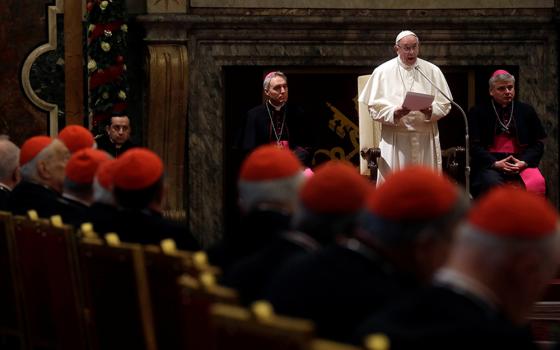If last night's debate had ended at the 20-minute mark, Donald Trump would have been declared the winner. On the issue of trade, he not only reinforced one of his core arguments, an argument that is winning him lots and lots of voters in swing states like Ohio and Pennsylvania, he also effectively tagged Hillary Clinton as the embodiment of the establishment. She twice employed the phrase "trumped-up trickle-down economics" as if it was so clever that it deserved to be repeated. It did not. She appealed to the opinions of experts on their different economic proposals, displaying precisely the kind of establishment tic that confirmed for voters that Trump was right to tag her as such. In how many previous debates have we heard an appeal to the experts, only to see our paychecks decline year after year? Worst of all, she kept looking down at her notes, and not at the camera. Shifting eye contact is ill advised for candidates facing doubts about their trustworthiness.
Then, when Clinton invoked the memory of the economic performance achieved under her husband's tenure, an argument that is not likely to excite the millennials she needs to excite, Trump interrupted with "Well, he approved NAFTA . ..." Trump went on to interrupt Clinton a minute later, and a minute after that, so that by the 40-minute mark, Trump had succeeded in reminding every woman in America that he is a lot like their worst boss or their first husband. Indeed, as the night wore on, she became less defensive and he became more so, except when she became defensive, she looked at her notes. When he became defensive, he sighed, and he snorted and he uttered strings of incoherent gibberish. These were interspersed with asides and references opaque to all but the most studied conspiracy theorists, introduced with no setup so that no one else had any idea what he was talking about. It was almost painful to watch.
In the final third of the debate, Clinton's weakest moment came when asked about race relations. Here is how she began her response:
Well, you're right. Race remains a significant challenge in our country. Unfortunately, race still determines too much, often determines where people live, determines what kind of education in their public schools they can get, and, yes, it determines how they're treated in the criminal justice system. We've just seen those two tragic examples in both Tulsa and Charlotte.
And we've got to do several things at the same time. We have to restore trust between communities and the police. We have to work to make sure that our police are using the best training, the best techniques, that they're well prepared to use force only when necessary. Everyone should be respected by the law, and everyone should respect the law.
On an issue of such passion, she sounded like a robot. (Memories of Mike Dukakis being asked about his reaction to Kitty being raped!) There was no reference to her childhood experience of being brought by her minister from her white Chicago suburb to downtown to hear Dr. King. She did not speak about the mothers of crime victims she has met. It was really awful. Trump's appeal to law and order certainly didn't help him with minority communities, but he has never been serious about reaching out to them: His target is the moderate suburban Republican women who have been reluctant to vote for him in part because he is so demeaning towards minorities, and law and order does rank high among the concerns of white, suburban, Republican women.
This one chance to get back into the debate quickly vanished for Trump as the discussion turned to birtherism. He tried to pin it on Clinton's 2008 campaign, specifically Sidney Blumenthal, Patti Solis Doyle, and "McClatchy," household names one and all. Sid Blumenthal is a Clinton hanger on, Solis Doyle ran Clinton's 2008 campaign until being fired after Super Tuesday, and McClatchy is a news site not a reporter, although Trump seemed to think otherwise. It was bizarre. More importantly, the rest of his answer was equally disjointed, the initial question about race relations reduced to Trump's concern about his own relations with the black community. Clinton's reply was devastating: "Well, just listen to what you heard." When the conversation returned to Trump, we heard this:
I'll go one step further. In Palm Beach, Fla., tough community, a brilliant community, a wealthy community, probably the wealthiest community there is in the world, I opened a club, and really got great credit for it. No discrimination against African- Americans, against Muslims, against anybody. And it's a tremendously successful club. And I'm so glad I did it. And I have been given great credit for what I did. And I'm very, very proud of it. And that's the way I feel. That is the true way I feel.
I am not a psychologist, but me thinks that anyone who says "I" that many times in one paragraph has more issues than a magazine rack.
The climax of Clinton's triumph came when Trump ran away from his remarks about how Clinton looked -- he had said she doesn't look "presidential" -- by saying he was only questioning her stamina. This might have worked in an interview on Fox & Friends the day after her health incident on 9/11. But, by the last third of the debate, when he raised the issue last night, she was the one who was hitting her stride and he was the one who looked like a mess. Her answer was strong and rehearsed, but it was the fact that she was so obviously in complete control of the room at that point which drove home the ridiculousness of his charge and his cluelessness about how the night was going.
In the days leading up to the debate, Trump and his team made much of the fact that he was not preparing for the debate the way she was: He trusted his gut and was unafraid to speak the truth, so why prepare? Alas, his campaign managers needed to tell him that even football players are expected to watch the tapes. By being so unprepared, Trump unwittingly turned Clinton's greatest liability into a strength: She is an establishment candidate from the incumbent party running when large majorities of people want change, but, it turns out, even that is better than someone whose lack of discipline and focus made it difficult for him to tangle with Lester Holt let alone Vladimir Putin or Raul Castro.
Nothing Trump did will probably cost him with his supporters, many of whom understood the opaque, conspiracy theory references. But he needed to move past his 42 percent ceiling by showing himself to be worth taking a chance. If anything, the moderate, suburban Republican women who have resisted joining his campaign found ample reasons last night to justify their resistance and half a dozen reasons to throw in for Hillary. He can afford to lose the first debate, but now he needs to show that he is willing to stretch and grow and change by preparing for the next two debates and acing them. I doubt he has it in him, and I further suspect that there were enough Trump sycophants on Fox last night to reassure him that his performance was okay. It wasn't. Similarly, Clinton is always at her worst when she thinks she can coast, and the race is still too close to think that. There are six weeks until Election Day, and both candidates need to be at the top of their game if they want to win the presidency. But Trump missed an opportunity last night to make himself acceptable to voters he needs, and there are not a lot of such opportunities left.
[Michael Sean Winters is NCR Washington columnist and a visiting fellow at Catholic University's Institute for Policy Research and Catholic Studies.]








